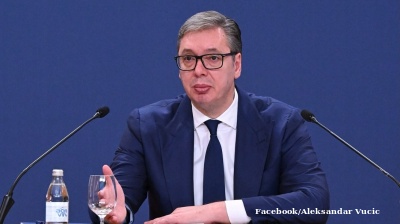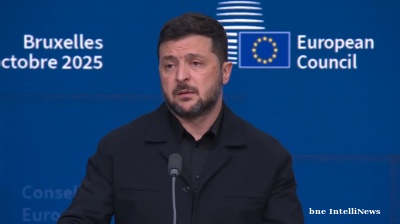The troops that Russia is assembling along Ukraine’s border would be more than able to embark on a full-scale invasion. But is this really Moscow’s intent? There are several reasons to suggest it is not the immediate plan – but none of these mean we should take the issue lightly, as Russia remains deadly serious about its political ends.
Military preparations are taking place that could herald a large-scale land invasion of Ukraine that would come from several directions. This would mean a huge war in the heartland of Europe, leading to large numbers of casualties and major changes to the international order. But it is hard to see how any of this would benefit Russia in either the domestic or the international context.
At home, it would impose a severe strain on a tired political system whose life and legitimacy is seeping away, and where change is overdue. While it is true that in 2014 the annexation of Crimea gave a boost to the political system when it was struggling with similar problems, this is unlikely to be repeated. The takeover of Crimea was popular precisely because it succeeded without a shot being fired, and because it was Crimea – no other piece of foreign land holds similar emotional significance for the Russian population. Furthermore, Russians’ main demand at the moment is for greater social welfare support, not great power conquests. A war with Ukraine would be unpopular, and the Kremlin – which keeps a keen eye on public opinion by conducting its own polls and focus groups – knows it.
On the international stage, an incursion would wreck Moscow’s dialogue with Joe Biden, which it values. The costs of war would be exacerbated by the harsh economic sanctions that would inevitably follow. Upending all its Western relationships, invading Ukraine would put Russia at the mercy of China both economically and politically, and in general decrease its room for manoeuvre.
The Kremlin could have concluded that its leverage over Ukraine is slowly weakening.
These considerations suggest the current war scare is actually what my former ECFR colleague Mark Galeotti termed “heavy-metal diplomacy”: using military mobilisation to force the West into discussing something it does not want to address – namely, the geopolitical order of Europe and Ukraine’s place within it.
There are several reasons Moscow may have selected this particular moment to make its request. First, the Kremlin could have concluded that its leverage over Ukraine is slowly weakening. Ukraine’s president, Volodymyr Zelenskiy, has this year started more vocally questioning the implementability of the Minsk agreements, which sought to resolve the conflict in Donbas. He has also begun frequently raising the question of Crimea. At the same time, Western countries have been training Ukraine’s armed forces and supplying (select) military equipment. This may have increased Moscow’s – admittedly irrational – fears that Kyiv might attempt to retake Donbas by military means. And even if not, Moscow’s hold on eastern Ukraine was clearly not performing its desired function – which was to be a diplomatic tool that would eventually lock in Russia’s leverage over Ukraine’s internal and external policymaking.
Secondly, Putin may feel that the Ukraine question is his to sort out, and it is better to do it sooner rather than later. He could also fear opinion changing within his own country, not least given ordinary Russians’ lack of interest in the issue. Nato enlargement to Ukraine is utterly anathema for Russia’s military planners. But beyond them, not all members of Russia’s political establishment share Putin’s obsession with the country, or his passionate view that the Ukrainians and Russians are the same people. “Putin sees that the next generation may care less, so he has decided that he must create facts for them,” one Russian policy insider told ECFR in October.
Thirdly, and perhaps paradoxically, Russia sees that in Biden it has someone with whom it can discuss these matters. Moscow has dismissed the attempts of Emmanuel Macron to discuss Europe’s geopolitical order, because it has never thought that Macron, France, or the European Union are able to have a decisive voice in these matters. Donald Trump was clearly also unable to conclude or deliver on any agreements. Biden, by contrast, has the capacity to speak on behalf of the West. And Moscow may assume that, with China as his priority, he may seek to accommodate Russia.
The US president now faces an unenviable task. He does not want to raise the stakes on Ukraine, or let the issue hijack his political agenda. He cannot give Russia what it wants – because Ukraine is not America’s to give away; and this is so not just in moral terms, but also in practical terms. While Moscow might not see it, Ukraine has agency: it may have weak political elites, but the country has a vigorous society that is very good at mobilising to veto agreements it does not like. When it comes to Nato, Biden surely has no intention to expand the alliance, but he cannot put a legal end to its enlargement either, because that would require the agreement of all allies and a redefinition of Nato’s internal documents. But it is also unlikely that simply refusing to discuss the issue will make it go away.
“A real war will start suddenly,” an influential Russian Telegram channel wrote over the weekend. The current troop mobilisation might be “heavy-metal diplomacy”, but the political demands behind it are serious. If they remain unaddressed, next time around facts on the ground might come before diplomacy.
Kadri Liik is a Senior Policy Fellow at the European Council on Foreign Relations (ECFR). This article first appeared here. She tweets at @KadriLiik
The European Council on Foreign Relations does not take collective positions. ECFR publications only represent the views of its individual authors.
-
Opinion

Armenia’s painful reorientation toward the West
Yerevan’s drive to break free from its dependency on Moscow is generating profound internal political turbulence and exposing it to new external risks, says a report by the Central Asia‑Caucasus Institute & Silk Road Studies Program.

COMMENT: Europe’s “fake it till you make it” war approach cannot hold off Russia’s trillion dollar war machine
In their speeches on the war in Ukraine, European leaders appear like a video clip looped on repeat. Standing before the cameras they declare new packages of support for Kyiv and threaten new measures to pressure Russia as if it was still 2022.

A year after the Novi Sad disaster, Belgrade faces one crisis after another
Serbia’s government is grappling with a convergence of crises which threaten to erode President Aleksandar Vucic’s once-dominant position.

Don’t be fooled, Northern Cyprus’ new president is no opponent of Erdogan, says academic
Turkey’s powers-that-be said to have anticipated that Tufan Erhurman will pose no major threat.



